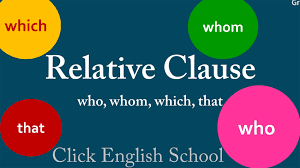Clause
In the previous blog, we learned about the Independent clause and Dependent clause. In this blog, we are going to learn about the Relative clause and Noun clause.
Types of Clause
1) Relative Clause
2) Noun Clause
Let's learn about each type of clause in detail and practice them to understand the concept better.
1) Relative Clause
A relative clause is used to modify a noun or a noun phrase. It is used to relate one part of its clause to the noun or the noun phrase using a relative pronoun such as - who, which, that.
It is also used to join two sentences talking about the same topic using the relative pronoun - who, which, that.
Example:
a) I bought a new car that is white in color.
In this case, the relative pronoun is that. It is joining two phrases in a sentence, therefore forming a relative clause. Both the phrases are informing about the same topic.
b) The tall man who gave Mohan a bar of chocolate was his uncle.
In this case, the relative pronoun is who. It is joining two phrases in a sentence, therefore it is forming a relative clause. Both the phrases are informing about the same topic.
c) The box of candies which John gifted Anne on her birthday was brought by him from Switzerland.
In this case, the relative pronoun is which. It is joining two phrases in a sentence, therefore it is forming a relative clause. Both the phrases are informing about the same idea or topic of the sentence.
2) Noun Clause
a) What is a Noun Clause?
A noun clause is a dependent clause that can replace a noun in a sentence. A noun clause can replace a subject, direct object, indirect object, or the objects of the preposition.
A noun clause has a subject as well as a verb in a sentence.
Example:
a) Please tell me who left his book on my desk.
In this case, the direct object in this sentence is the book. It is directly mentioning about the book. A book is a noun, hence it is a noun clause.
b) Whoever is the last one to stand in the line will keep the record of the roll numbers of the students.
In this case, the subject is used in this sentence. The subject is whoever. A person is a noun hence, it is a noun phrase. It is used as a noun in a sentence hence it is a noun clause.
c) He knows all about music, which is his evolving as a career for him.
In this case, the word - which is used to join two sentences. He is the noun in the sentence as it is a human being or a person. Hence, it is a noun clause used in a sentence.







Comments
Post a Comment